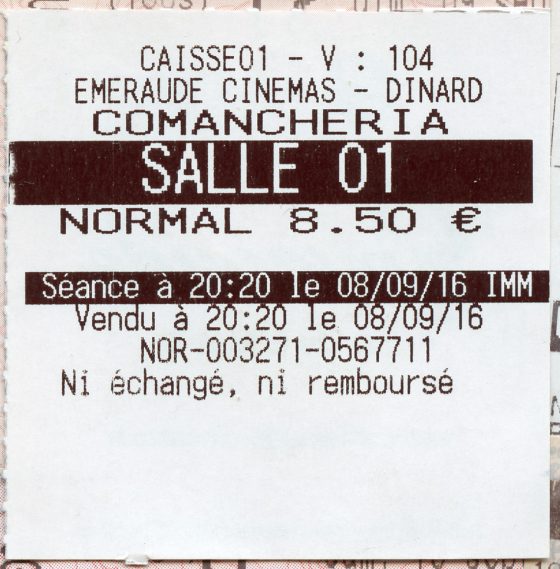Looper & Hell or High Water

Killing Babies. Lots and Lots of Babies. Seriously, stacked like cordwood.
Having babies is great. Sure, they destroy the planet and annoy me at coffee shops, but they do provide lazy motivation for screenwriters. I’ve talked about this before, and you’d be right in suspecting I’ll talk about this again, but Hell or High Water provides some interesting insights into the phenomenon of the baby excuse.
The usual suspects are there: the absent/estranged father who wants to save his children without having to interact with them so he can do cool stuff like rob banks. All perfectly normal. And disturbingly the ending – that it’s perfectly okay to kill people for your kids – is nothing new. Ooh, fun, let’s talk about Looper.


This one always bugged me. Reading my notes (always interesting to see how films age), I generally liked watching it more than I do remembering it now. The second difficulty are notes that say ‘what Bruce does is great!’ This is always true. Duh. But not so helpful four years on.
Watching it again, I enjoyed it more than my memory and less than the first time I saw it. Which is how you know that movie criticism is a science.
No, seriously. Science is completely fucked.
Like all time travel movies, Looper has more contradictions about time travel than the movies that went back in time and got made before it. I believe the first version of this article said:
This may be the least plausible time travel film ever made, and that is saying something. We can imagine the implausibility spectrum beginning at Looper, moving then to Terminator 2, to Twelve Monkeys, to The Simpsons S03E04 and ending with the Get a Life super race of goats episode. That’s the most realistic.
And one could certainly pick those inconsistencies apart. Fortunately the film does it for us, having Mr. Bruce Willis simply say: ‘I don’t want to talk about that time travel shit.’ He said shit, so you know he means it. I recently learned this was called Lampshade Hanging, where one deliberately calls attention to plot holes in the dialog. Thanks for making it more confusing, TVTropes.com! Why didn’t you just name it the Third Peter Hyams Rule of Doggies?

Poor ink for the Duke of Yorks. If I don’t upload these tickets to an unstable erasable medium, whatever will happen to them?
It’s not the drunk guy head object placing that makes the first part of the film work. No, it’s successful because of its dogged inventiveness and style. Instead of elaborate FX, people from the future just appear and are shot. The silence and pedestrianism of the gag is disturbingly effective.
The film’s main conceit, that bodies are hard to dispose of in the future and are sent back is unique, and its singularity pulls you along. Even when Mr. Joseph Gordon-Levitt/Mr. Willis is shown in the future, killing lots of people, and lots of people killing lots of other people without having to send them back or getting caught. But the font. Look at the font!
The film begins to struggle half-way through, less a failure of plot than of theme. As Mr. Willis confronts his arrogant younger addict self in Mr. Levitt, this is shaping up to be a film about maturity. The film, despite the gaping contradictions, had been rather strong up to this point. Instead, babies.
Don’t get me wrong, when Mr. Willis actually kills a kid, you realize that you’re in different kind of movie, one that is willing to go all the way. But you’re also in a different movie.
There are, from my best guess, three movies here. One about maturity, one about killing Stalin (I, for one, am sick of fucking hearing about Hitler. Stalin. 60 million. I’ve said it before, and I’m still learning stuff. The 30 million Russian killed during WW2? Lost almost exclusively due to that idiot’s denial of German forces gathering on the USSR border, said denial manifesting in actually killing generals who contradicted him. How am I, of all people, just learning about this? Because TPTB (The Powers That Be) keep making movies about Nazis, another trailer I saw at the screening of…Hell of High Water. This parenthetical, like a time travel inconsistency, is now complete), and the cycle of violence.
And the last theme would have been rather sweet, that Mr. Gordon-Levitt sacrifices himself to turn future kid Stalin into a good guy (though a better ending is that he shoots his finger instead of killing himself, so that he could raise the kid, thus uniting the theme of maturity, instead of, well, guess what, avoiding dealing with the reality of raising kids. Hey, it all connects up. Like time travel). But simply having him tell the audience that this is what the ending is about doesn’t play. He can’t travel to the future! That would be ridiculous!
Looper: The Take

$8.00


Hell or High Water has some good qualities to foreground so I can feel righteous when I tear it apart. There’s a sense of place with cowboys running their cattle away from fields on fire (‘You understand why our kids don’t want to do this shit’), and some cranky waitresses. Underwritten, but still. It shows some work on the research end, and some promise.
Unfortunately – and not unlike the surprisingly similar Carancho – these details fail to translate into plot. Genre is tricky, and Mr. Taylor Sheridan is not somebody who knows it very well. It does not help that our erstwhile director Mr. David Mackenzie has some kind of love affair with the drone during car chases…scratch that…cars driving at speed limits and not being chased.

Sad that I didn’t get to take my free ticket from my Gaumont subscription, happy to be able to bike to a theater. Will revenge beat practicality? Ah… remember, actually compelling choices for characters?
Of late, there is a depressing lack of care and interest in genre. The story of a bank trying to take your mother’s land, and stealing from that bank to get the loan payments is classic genre. It distills the poor vs. rich into a choice and a direction, which is much better than signposting it. Signposting it by, say, billboarding it. Showing, more than once, ‘Cash for Gold!’ and beginning with a ‘ruh-roh’ graffito of ‘veterans deserve more adequate renumeration’ or something to that effect at the opening.
There’s a reason you don’t lamely reveal that storyline halfway through. This is your lede. It’s banks vs. farmers manifest, not plastered on the side of a building for a dronecam to speed by. The theme becomes the choice becomes the story.
The lack of awareness of the function of genre (that is, using choice to awaken the themes) comes up in a variety of other ways, notably our detective Mr. Jeff Bridges. Mr. Bridges first psychically seems to know that, like no other bank robber in history, they’re going to get a certain amount of money, then stop. This is moderately implausible, but not helped by even a weak ex-post-facto Sherlock Holmes-spun explanation how he figured that out. And like most Sherlocks Holmes of the 21stC, he just knows.
Ya know. Because.
Anyhoo, no one uses ‘anyhoo’ anymore. Anyway, when Mr. Bridges stakes out another bank, he knows they’re coming here next. Until he looks at a map that he already looked at, draws a conclusion that he’s already drawn, and knows now that they’re going to another bank. I guess he had to wait to know this so he couldn’t be there until after the climax so his partner could get shot and his could shoot the guy’s brother and stuff. Which he knew was going to happen, I guess.
Like so many films, this is a problem of endgame, and wanting so much to get to that point you wrote first. If Mr. Ben Foster goes off to ‘sacrifice himself’ (index card says Troubled Brother Must Sacrifice Himself For Emotion), then it gives away the relationship, and from a plot point of view means that he’s sacrificed himself and put his brother in more danger of discovery. It was a really expensive index card.
(And speaking of unreasonable expectations of non-time-travel movies, I have news for Mr. Sheridan. Trusts ain’t sealed to criminal subpoenas, especially when a cop’s been killed. Yes, even trusts for children.)
Which leads us, finally, to killing kids. Yay! We made it!
See, the ending is Mr. Bridges the cop knows that Mr. Chris Pine the criminal set up the scheme that led to his dead partner and two other guys who probably didn’t have kids so fuck them. They confront each other, and maybe are going to draw down, but then, naturally, kids show up, leaving the actual end up to the audience.
But here’s the thing about ambiguity – it ain’t so ambiguous. Ambiguity actually implies two different scenarios, and that we, as the audience, should stroke our chins and ponder that yeah, that could totally be me. And maybe that’s true. But if it is, we are fucked.
Because the scenarios aren’t equal by a long shot. The ambiguity implies that ‘doing it for your kids’ is problematic, instead of fucking straight evil. I get it. Having kids means, like any form of writing, we have to make threats for them. So we imagine stuff. But since 1992 (see below) there’s been an evolution:
Killing an evil guy to save your kid becomes…
…killing good guy to save your kid’s life becomes…
…killing a bunch of good guys to save your kid’s life….
…killing a bunch of good guys to save…some money for your kid’s jetski. The cool one. With the stripes!
And for HoHW, that’s actually the story. And I fucking goddamned well have a problem with it. It’s like the The Positively True Adventures of the Alleged Texas Cheerleader-Murdering Mom took twenty three years to mutate from a terrifying cautionary satire to an instruction manual.
The Take: Hell or High Water

I stand by this.
$1.00
Endings are hard, and they can ruin good and even great film. Up to this point, HoHW is only an average one, so it has little chance. ‘Because of children’ is problematic ethically sure, but there are story issues as well. I don’t know what they are because I hate children and really just know there have to be.
Said prejudice I will now make the point. These endings are increasingly about the sacrifice of one for many. Stalin would approve; Spock would not. I guess it’s okay to kill one group to protect yours, however narrow your group is becoming and wide the other one is. It’s okay, I guess. As long as there’s somebody left to travel back in time to kill you.
The Lonely Comments Section

 [logo]
[logo]